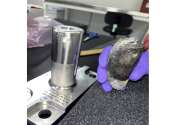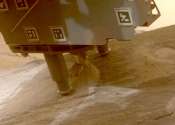Last update:
Space Exploration news

NASA's VIPER moon rover gets its head and neck
In this image from Feb. 12, 2024, engineers lift a mast into place on NASA's VIPER (Volatiles Investigating Polar Exploration Rover) robotic moon rover. VIPER's mast and the suite of instruments affixed to it look a lot like ...
Space Exploration
34 minutes ago
0
0

Citizen science project classifying gamma-ray bursts
When faraway stars explode, they send out flashes of energy called gamma-ray bursts that are bright enough that telescopes back on Earth can detect them. Studying these pulses, which can also come from mergers of some exotic ...
Astronomy
4 hours ago
0
2

Space exploration: A luxury or a necessity?
"Oh, come on Daniel, space travel is so expensive, and pointless!" These were the words of my friend Max, during a Christmas party where I was discussing my thesis project: studying places on Earth where the living conditions ...
Space Exploration
5 hours ago
0
14

Supporting the future of Mars exploration with supercomputers
You may have flown a flight simulator in a computer game or at a science museum. Landing without crashing is always the hardest part. But that's nothing compared to the challenge that engineers are facing to develop a flight ...
Space Exploration
12 hours ago
1
56

NASA confirms mystery object that crashed through roof of Florida home came from space station
NASA confirmed Monday that a mystery object that crashed through the roof of a Florida home last month was a chunk of space junk from equipment discarded at the International Space Station.
Space Exploration
13 hours ago
0
74

NASA is seeking a faster, cheaper way to bring Mars samples to Earth
NASA's plan to bring samples from Mars back to Earth is on hold until there's a faster, cheaper way, space agency officials said Monday.
Space Exploration
13 hours ago
1
48

Formation-flying spacecraft could probe the solar system for new physics
It's an exciting time for the fields of astronomy, astrophysics, and cosmology. Thanks to cutting-edge observatories, instruments, and new techniques, scientists are getting closer to experimentally verifying theories that ...
Astronomy
Apr 15, 2024
0
37

A new type of seismic sensor to detect moonquakes
During the Apollo missions of the 1970s, several seismometers were flown to the moon, where they collected data on lunar seismic trembling for eight years. The data showed some lunar quakes were as powerful as a magnitude ...
Space Exploration
Apr 12, 2024
0
65

SpaceX is launching more rockets from a military base: Can the Coastal Commission impose a limit?
SpaceX has significantly increased the frequency of its rocket launches from a Santa Barbara County military base, and its plans to add even more have raised concerns by the California Coastal Commission over the impacts ...
Space Exploration
Apr 12, 2024
0
25

NASA unveils probe bound for Jupiter's possibly life-sustaining moon
US space scientists on Thursday unveiled the interplanetary probe NASA plans to send to one of Jupiter's icy moons as part of humanity's hunt for extra-terrestrial life.
Space Exploration
Apr 12, 2024
0
480

Examining the blowtorch effect of satellite reentry through video
A reaction wheel—one of the heaviest parts of a space mission, its changing rotation used to shift a satellite's orientation—seen in a plasma wind tunnel belonging to the High Enthalpy Flow Diagnostics Group (HEFDiG) ...
Space Exploration
Apr 11, 2024
0
2

NASA technology helps guard against lunar dust
Defeating dust may be a small concern for most people on Earth, but for astronauts and spacecraft destined for the moon or Mars, it is a significant hazard that must be mitigated. That's why researchers at NASA's Kennedy ...
Space Exploration
Apr 11, 2024
0
27

Wireless power transmission could enable exploration of the far side of the moon
How can future lunar exploration communicate from the far side of the moon despite never being inline with the Earth? This is what a recent study submitted to IEEE Transactions on Aerospace and Electronic Systems hopes to ...
Space Exploration
Apr 11, 2024
0
13

In Russia's Far East, a new heavy-lift rocket blasts off into space after two aborted launches
Russia on Thursday successfully test-launched a new heavy-lift rocket from its Far Eastern space complex, a lift-off that comes after two aborted attempts earlier this week.
Space Exploration
Apr 11, 2024
0
23

Japanese astronaut to be first non-American to set foot on moon
A lucky Japanese astronaut will become the first non-American to set foot on the moon during one of NASA's upcoming Artemis missions, US President Joe Biden announced Wednesday.
Space Exploration
Apr 11, 2024
0
50

Through astronaut eyes, virtual reality propels gateway forward
NASA astronauts are using virtual reality to explore Gateway. When they slip on their headsets, they're not just seeing the station—they're in it, meticulously surveying every detail and offering crucial insights on design ...
Space Exploration
Apr 10, 2024
0
5

New NASA strategy envisions sustainable future for space operations
To address a rapidly changing space operating environment and ensure its preservation for generations to come, NASA released the first part of its integrated Space Sustainability Strategy, on Tuesday advancing the agency's ...
Space Exploration
Apr 10, 2024
0
2

Biden says Japanese will be first non-American on moon
A Japanese person will be the first non-American to walk on the moon, US President Joe Biden announced Wednesday during a state visit by Japan's prime minister.
Space Exploration
Apr 10, 2024
0
57

OK, the eclipse was cool, but those glasses aren't. Now what?
OK, you hopped on the eclipse bandwagon, did your research and viewed the celestial miracle responsibly. But now what are you going to do with those odd-looking glasses?
Space Exploration
Apr 10, 2024
0
15

After delay, Delta IV Heavy lifts off for the last time
The storied career of the Delta family of rockets had to wait a little longer than planned to turn the page on its final chapter, but the last of its kind lifted off on the Space Coast on April 9.
Space Exploration
Apr 10, 2024
0
1
More news

Russia aborts second attempt to launch a heavy-lift rocket from Far East

What could we build with lunar regolith?

Russia aborts planned test launch of new heavy-lift space rocket

Delta eclipse flight: Here's what it was like

Nukes in space: A bad idea in the 1960s, an even worse one now

The Latest: Dallas students elated by eclipse

Totality insanity: Eclipse frenzy hits North America

SpaceX knocks out early morning Starlink launch from Cape Canaveral

S. Korea says second spy satellite placed in orbit

What do scientists hope to learn from total solar eclipse in US?

Why unprotected eclipse gazing will leave you seeing stars

Eclipse weather forecast: clear skies in the Northeast, clouds in Texas
Other news

Surf clams off the coast of Virginia reappear and rebound

Yellowstone Lake ice cover unchanged despite warming climate

The history of the young cold traps of the asteroid Ceres

New benzofuran synthesis method enables complex molecule creation

Human odorant receptor for characteristic petrol note of Riesling wines identified

Research team identifies culprit behind canned wine's rotten egg smell

New research could enable more—and more efficient—synthesis of metastable materials

Trash to treasure—Researchers turn metal waste into catalyst for hydrogen

Research team shows island bats are valuable allies for farmers

Spiraling insights: Scientists observe mechanical waves in bacterial communities

Attosecond imaging made possible by short and powerful laser pulses

NASA achieves milestone for engines to power future Artemis missions

Video: Ariane 6 passes tests in preparation for first flight

Three companies in the running for NASA's next moon rover

Total solar eclipse forecast: Will your city have clear skies Monday?

A robot hopper to explore the moon's dangerous terrain

A single atom layer of gold—researchers create goldene

Climate-change-driven cold snaps threaten marine life

'One ring to rule them all': How actin filaments are assembled by formins




























